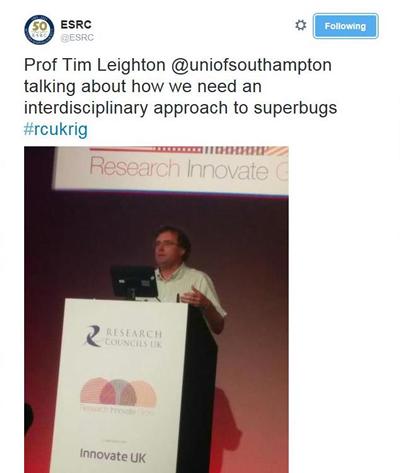Tim Leighton helps to showcase the UK’s world-leading research and innovation

NAMRIP Chair, Tim Leighton, joined more than 300 business leaders, entrepreneurs, world-leading researchers, parliamentarians and policymakers at the Queen Elizabeth II Centre in Westminster as part of the Research Councils UK (RCUK) first 'Research, Innovate, Grow' conference.

The event demonstrated the RCUK ambition to ensure that the UK remains the best place in the world to do research, innovate and grow business. Interactive exhibits highlighted some of the ground-breaking and innovative research funded by the seven Research Councils and attendees were able to interact with the researchers involved.
Following talks by Sajid Javid, Secretary of State; Jackie Hunter, CEO of BBSRC; Ruth McKernan, CEO of Innovate UK; Menelas Pangalos, the AstraZeneca Executive Vice President for Innovative Medicines & Early Development; and Ric Parker, Director of Research and Technology for Rolls Royce, Tim was introduced by Kevin Baughan, Director of Technology and Innovation, Innovate UK.
In his talk: 'Building a cluster of excellence for combatting superbugs', Tim outlined how NAMRIP had been designed and put together and how it was funded. He described the work of some of the members, specifically:
- the work on biocidal paints by Liam Goodes (Centre for Advanced Tribology, FEE);
- the work on catheters by Sandra Wilks (Biological Sciences) and Jaqui Prieto (Health Sciences)
- development and marketing of the ‘Microguide’ app to assist choices in antibiotic use (70% of doctors surveyed said they had this on their phone and accessed it roughly once per week);
- the work on joint replacement surgery by Martin Browne, C. Woods & Alex Dickinson (FEE);
- building a solar powered water treatment facility in the developing world (A.S Bahaj and Patrick James, FEE);
- several projects on how to avoid the use of antibiotics:
- treatment of cattle hoofs (Emma Roe, Social and Human Sciences)
- trialling the use of engineered honey (S. Pender and R. Salib, Medicine)
- fish farms (Paul Kemp, FEE).
These examples came from the NAMRIP researchers who had submitted powerpoint slides for NAMRIP to use when disseminating our work at conferences and like occasions. Why not submit your own slide or web page? (contact Frances Clarke for style details).
By 2050 drug resistant diseases could be killing more people than cancer, an extra 10 million deaths per year. They would also cause a loss to the global output of 100 trillion dollars - that is equivalent to a sum greater than the current global economy. Catastrophes in healthcare and food production will not be prevented by researchers who work in their isolated comfort zones, always suggesting their own area of expertise as the solution rather than working across disciplines to find the best solution. It is hard, but necessary, to work across the barriers between disciplines. The RCUK-funded NAMRIP aims to break down these barriers so that we can change the way people think about the problem, and find the solutions. For example, engineers, physical and biological scientists, and social, human and health scientists, can talk to clinicians and food producers to understand the problems and design solutions. They can then work with psychologists and experts in ethics and law to ensure these solutions are usable; and then work with business experts to find a way to make these solutions available on large scale and at an affordable price which the user (for example the NHS, farmers) can afford. Medicine and health sciences academics can then provide clinical trials to ensure their effective scale up.
We are delighted to be holding such an exciting and engaging event to show how the UK is a world leader in research and innovation, with a reputation for excellence of which we are immensely proud. We truly punch above our weight on the global stage in terms of the quality of research we produce and its high impact on economic growth and prosperity. Strong, sustained investment in the UK research base is essential to strengthen and let fly the excellence, creativity and impact of the UK’s world leading researchers, innovators and businesses. We need to invest now to secure its future
Notes for editors
Further information about Research Innovate Grow and the work of the Research Councils in securing this ambition is available in this short film and the Research Innovate Grow brochure.
NAMRIP is funded by the University of Southampton and benefits hugely from £868,704.00 of funding from EPSRC's Network for Antimicrobial Action 'Bridging the Gap' call [EP/MO27260/1]. The MRC has also invested in NAMRIP, with one project already announced
